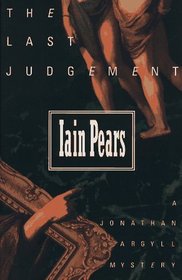Helpful Score: 3
This is the third of Pears' "art-history mysteries" that I've read - and I really love them. British art dealer Jonathan Argyll and his girlfriend Flavia, a whiz on the Roman police's art squad, are, not surprisingly, always finding themselves mixed up in unsavory doings concerning art...
In this case, Jonathan agrees to deliver an unexceptional painting entitled 'The Death of Socrates' to a client as a favor to a colleague. However, when not only does someone try to steal it from him at the train station, but the client quickly ends up brutally murdered, he realizes not everything about this deal may be on the up-and-up.
A well-crafted plot, engaging and interesting characters, and well-researched details place Pears' mysteries well above average for the genre.
In this case, Jonathan agrees to deliver an unexceptional painting entitled 'The Death of Socrates' to a client as a favor to a colleague. However, when not only does someone try to steal it from him at the train station, but the client quickly ends up brutally murdered, he realizes not everything about this deal may be on the up-and-up.
A well-crafted plot, engaging and interesting characters, and well-researched details place Pears' mysteries well above average for the genre.
Helpful Score: 2
Fourth in series of the Jonathan Argyll art history mysteries in which ghosts of the past float up to haunt Flavia and Jonathan as they try to figure out how a painting that Jonathan bought figures into two murders and a multitude of other curious incidents. Enjoyable read as always, as our two intrepid heroes jaunt across Europe chasing answers about an obscure and unimportant painting, The Death of Socrates, and the people who owned it in the past. Tied in with Nazi war criminals, Resistance members, and people who aren't what they seem, the painting is causing Jonathan more trouble than he ever dreamed possible.
Helpful Score: 1
Iain Pears "lite" as opposed to his heavier works such as The Dream of Scipio or An Instance of the Fingerpost. His art detective books are all good, es pecially, of course, if you're interested in art or art history.




